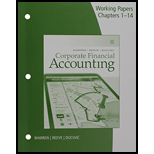
Bond investment: Bond investments are debt securities which pay a fixed interest revenue to the investor.
Debit and credit rules:
- Debit an increase in asset account, increase in expense account, decrease in liability account, and decrease in
stockholders’ equity accounts. - Credit decrease in asset account, increase in revenue account, increase in liability account, and increase in stockholders’ equity accounts.
To journalize: The bond investment transactions of S Products.
Explanation of Solution
(a)
Prepare journal entry for purchase of $120,000, 5% bonds of I Incorporation at 100% with an accrued interest of $1,000.
| Date | Account Titles and Explanations | Post. Ref. | Debit ($) | Credit ($) | |
| Investments–I Incorporation | 120,000 | ||||
| Interest Receivable | 1,000 | ||||
| Cash | 121,000 | ||||
| (To record purchase of M City bonds for cash) | |||||
Table (1)
- Investments–I Incorporation is an asset account. Since bonds investments are purchased, asset value increased, and an increase in asset is debited.
- Interest Receivable is an asset account. Since interest to be received has increased, asset value increased, and an increase in asset is debited.
- Cash is an asset account. Since cash is paid, asset account decreased, and a decrease in asset is credited.
(b)
Prepare journal entry to record the interest revenue received.
| Date | Account Titles and Explanations | Post. Ref. | Debit ($) | Credit ($) | |
| Cash | 3,000 | ||||
| Interest Receivable | 1,000 | ||||
| Interest Revenue | 1,000 | ||||
| (To record receipt of interest revenue) | |||||
Table (2)
- Cash is an asset account. Since cash is received, asset account increased, and an increase in asset is debited.
- Interest Receivable is an asset account. Since interest to be received is received, asset value decreased, and a decrease in asset is credited.
- Interest Revenue is a revenue account. Since revenues increase equity, equity value is increased, and an increase in equity is credited.
Working Notes:
Compute amount of interest received from I Incorporation.
(c)
Prepare journal entry for $60,000 bonds of I International sold at 101%, with an accrued interest of $100.
| Date | Account Titles and Explanations | Post. Ref. | Debit ($) | Credit ($) | |
| Cash | 61,100 | ||||
| Interest Revenue | 500 | ||||
| Gain on Sale of Investments | 600 | ||||
| Investments–I Incorporation | 60,000 | ||||
| (To record sale of I Incorporation bonds) | |||||
Table (3)
- Cash is an asset account. Since cash is received, asset account increased, and an increase in asset is debited.
- Interest Revenue is a revenue account. Since revenues increase equity, equity value is increased, and an increase in equity is credited.
- Gain on Sale of Investments is a revenue account. Since revenues increase equity, equity value is increased, and an increase in equity is credited.
- Investments–I Incorporation is an asset account. Since bond investments are sold, asset value decreased, and a decrease in asset is credited.
Working Notes:
Calculate the cash received from the sale of bonds.
| Particulars | Amount ($) |
| Cash proceeds from sale of $60,000 bonds
|
60,600 |
| Add: Accrued interest revenue | 500 |
| Cash received | $61,100 |
Table (4)
Calculate the realized gain (loss) on sale of $60,000 bonds.
| Particulars | Amount ($) |
| Cash proceeds from sale of $60,000 bonds
|
60,600 |
| Cost of bonds sold | (60,000) |
| Gain (loss) on sale of bonds | $600 |
Table (5)
Want to see more full solutions like this?
Chapter D Solutions
Working Papers for Warren/Reeve/Duchac's Corporate Financial Accounting, 14th
- Job 528 was one of the many jobs started and completed during the year. The job required $11,200 in direct materials and 40 hours of direct labor time at a total direct labor cost of $12,600. If the job contained five units and the company billed at 65% above the unit product cost on the job cost sheet, what price per unit would have been charged to the customer?arrow_forwardCalculate the net cash provided by operating activities of this financial accounting questionarrow_forwardgiven answer of this General accounting questionarrow_forward
- Burson Enterprises' May 31 bank reconciliation shows deposits in transit of $850. The general ledger Cash in Bank account shows total cash receipts during June of $48,500. The June bank statement shows total cash deposits of $44,300 (including $1,500 from the collection of a note; the note collection has not yet been recorded by Burson). What amount of deposits in transit should appear in the June 30 bank reconciliation? Helparrow_forwardWhat should be the adjusted cash balancearrow_forwardHii, tutor give me Answerarrow_forward
- General Accountingarrow_forwardJuno Manufacturing produces lamps that require 2.8 standard hours per unit at an hourly rate of $14.00 per hour. If 5,800 units required 15,900 hours at an hourly rate of $13.60 per hour, determine the following: a) Direct labor rate variance b) Direct labor time variance c) Total direct labor cost variancearrow_forwardprovide correct answer of this General accounting questionarrow_forward
- 4 POINTSarrow_forwardIn the month of September, a department had 9,500 units in beginning work in process that were 60% complete. During September, 28,500 units were transferred into production from another department. At the end of September, there were 5,500 units in ending work in process that were 50% complete. Materials are added at the beginning of the process, while conversion costs are incurred uniformly throughout the process. A. The equivalent units of production for materials in September were __. B. The equivalent units of production for conversion costs for September were __.arrow_forwardAnswer ?arrow_forward
- Principles of Accounting Volume 1AccountingISBN:9781947172685Author:OpenStaxPublisher:OpenStax College
 Intermediate Accounting: Reporting And AnalysisAccountingISBN:9781337788281Author:James M. Wahlen, Jefferson P. Jones, Donald PagachPublisher:Cengage Learning
Intermediate Accounting: Reporting And AnalysisAccountingISBN:9781337788281Author:James M. Wahlen, Jefferson P. Jones, Donald PagachPublisher:Cengage Learning

